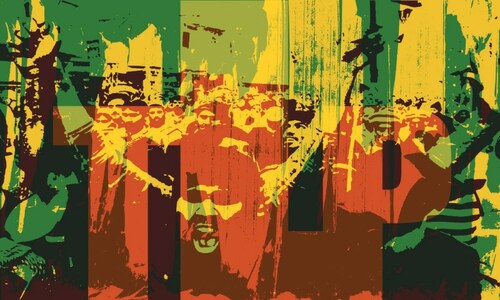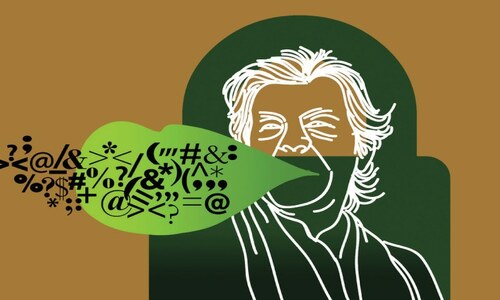In a 2011 essay, political scientist Dr Muqtedar Khan acknowledged that it was only after the creation of Pakistan in 1947 that any serious attempt was made in the Muslim world to create a ‘model for Muslim democracy.’ He was reinforcing an observation that was previously aired by the political scientists G.W. Choudhury (in 1963) and by L.D. Hayes (in 1984).
Critics of this notion, however, often highlight the names of Abul Ala Maududi, Hassan al-Banna and Sayyid Qutb, as being the pioneers of 20th century Islamic political thought. However, Dr Khan explains these gentlemen as ‘Islamist ideologues’ who contributed little towards the construction of a democratic Islamic political theory.
According to Khan, Choudhury and Hayes, the debates that took place from 1947 till the passage of Pakistan’s first constitution in 1956, highlighted issues about how Islam would shape politics and political structures in the modern world. Khan writes that these debates were shaping a promising political theory, which was the result of an intellectual exercise that ventured to put forth a rational understanding of Islam in the contexts of constitutionalism and democracy.
Even though Pakistan’s first experiment with constitutionalism in this respect was thwarted by a military coup d’état in 1958, the debates continued. But, by then, the state alone monopolised the navigation of these debates. It retained the ‘modernist’ aspects of the fledgling theory, but ousted from it the need for the polity to have the final say through a democratic process.
So what was the theory? It was still a work-in-progress. It posited that Islam was compatible with democracy and/or political and economic modernity because it was inherently a pluralistic and progressive faith. Therefore, the theory stated that, even though a Muslim-majority country such as Pakistan was a modern construct, it could retain its Muslim characteristics without becoming an Islamic state or an ‘Islamic leviathan.’
Those pushing this theory, often criticised Islamist groups such as Maududi’s Jamaat-i-Islami, for advocating a totalitarian state (the leviathan) in the name of Islam. The theory suggested that totalitarianism was antithetical to Islam.
Modernist Islamic political theory, stripped of the polity’s democratic and pluralistic role, inevitably leads to what its theorists strove to avoid — a theocratic totalitarian state
The anti-democratic nature of the Muslim regimes that adopted one aspect of this theory (Islamic modernism), but undermined the theory’s democratic and pluralistic notions, inadvertently bolstered the status of their Islamist opponents.
In Pakistan, growing urbanisation and an increase in population saw the state faltering in addressing the population’s economic needs. This triggered widespread discontent in the late 1960s. Things then worsened with the loss of former East Pakistan in 1971 and a military defeat at the hands of archenemy India.
The ‘humiliation’ of the defeat and economic frustrations pushed large sections of the polity to become more responsive to the narrative of the Islamists. This narrative directly countered the aforementioned theory for being a veiled version of secularism, and of being ‘elitist.’ With the authority of the state now receding, political parties jumped in to fill the void.
Secular parties, especially the populist and left-leaning PPP, were quick to gauge the mood below and act accordingly when they came to power in December 1971. On the other hand, even though just 18 members from various Islamist parties managed to win a seat in the new National Assembly, they were often supported by non-Islamist MNAs from the opposition.

Thus began the ruling party’s attempt to monopolise sentiments being aired by the Islamist parties. The result of this was not really the full fruition of the democratic aspects of the theory. Rather, all that was antithetical to it was mainstreamed. The modern Muslim democratic model, imagined in the 1950s and then shaped by a non-democratic set-up in the 1960s, quickly disintegrated into becoming something akin to a fusion of political populism and ‘Islamism.’ The country’s slide into becoming an ‘Islamic leviathan’ begins here.
The introduction of democracy was initiated when populist Islamist sentiment had begun to rear its head. Apart from the fact that the Islamist parties were only interested in democracy to enter the political corridors from which they had once been barred, secular parties couldn’t help but jump on the bandwagon of ‘Islamism’, and use it to remain relevant among a polity that was now being told that “Islam is the only solution.”
Eventually, the idea soon mutated to mean that this solution did not require democracy. Therefore, the 1977 coup d’état. A new military regime decided to stay on for 11 years on the pretext that the state alone had the ability to enforce ‘a real Islamic system.’ It was the same state that, till 1971, had claimed that it alone could avert the anarchy that an Islamic leviathan could trigger.
But now it had become a leviathan itself by ‘Islamising’ the military, introducing so-called ‘Islamic laws’, and gathering as allies a motley crew of political and societal Islamist groups, state-sponsored political parties, and capitalists liberated from economic regulations.
The idea of Muslim democracy was not entirely abandoned; it had become what the 19th century founder of Mormonism, Joseph Smith, had advocated as ‘theo-democracy’, or a fusion of republicanism and theocratic rule. This was especially true when democracy was supposedly ‘restored’ in Pakistan in 1985, during a dictatorship.
According to Dr Khan, ever since the 1970s, political discourse in the Muslim world has been crafted more by ‘Islamists’ than political theorists. This has retarded the study of political Islam, making it seem that it was unwilling to work within the framework of democracy.
In an essay for the Routledge Handbook of Political Islam, Professor Shahram Akbarzadeh writes that Islamists claim to be reacting against ‘Westernisation.’ They address this ‘issue’ by working to revive traditions that they claim were part of an ideal Muslim past. Yet, Islamism itself is a 20th century phenomenon. According to Akbarzadeh, the aim of Islamists is to capture the modern state machinery that is almost entirely a Western construct.
Islamists also claim to have the only ‘correct’ interpretation of Islam. All other interpretations are deemed heretical. According to Akbarzadeh, “this self-righteous perspective is intellectually debilitating and politically dangerous, especially when Islamism is transformed from a social force into a position of authority.”
So, does making room for Islamists in the mainstream structures of power actually lessen their radicalism? Or, does this make the structures more radical, threatening to make the state Islamist? The dreaded theocratic leviathan.
Published in Dawn, EOS, November 21st, 2021
















































